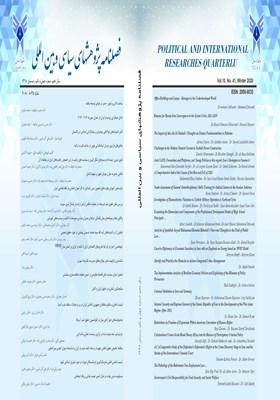ناتوی عربی؛ زمینهها و بسترهای شکلگیری و سیاستهای ترامپ در این خصوص: راهبردهای ایران در مقابله با آن
محورهای موضوعی : مجله پژوهش های سیاسی و بین المللی
کلید واژه: آمریکا, ایران, راهبرد, اسرائیل, ناتوی عربی,
چکیده مقاله :
محمدرضا داوطلب[1]- علی اصغر کاظمی زند[2]- مهدی ذاکریان[3]-حمید احمدی[4] تاریخ دریافت: 1/6/1398- تاریخ پذیرش: 20/6/1398 چکیده: با به قدرت رسیدن دونالد ترامپ در آمریکا، که نگرشی متفاوت با سطحی از کنشهای افراطگرایانه را نسبت به مسائل مختلف جهانی و منطقه ای اتخاذ میکند تهدیدهای امنیتی را برای بازیگران مختلف بوجود آورده است. این نگرش جدید ایران را نیز بعنوان کانون اصلی تحولات منطقه خاورمیانه تحت تاثیر قرار داده است. دولت ترامپ مقابله با ایران را در چارچوب امنیتیسازی مسائل در منطقه خاورمیانه گام به گام دنبال می کند. طرح ایجاد ناتوی عربی نیز در کانون سیاستهای خاورمیانهای ترامپ قرار داشته و هدف نوشتار حاضر را شکل میدهد. در همین راستا، در مقاله حاضر، این پرسش اصلی مطرح شده که اهداف دولت ترامپ از طرح ناتوی عربی در خاورمیانه چیست و با چه موانعی مواجه خواهد بود؟ در مقابل این پرسش اساسی فرضیه مقاله بدین شکل تدوین یافته است که " بنظر می رسد هدف شکل گیری ناتوی عربی تحدید نفوذ منطقه ای ایران و ایجاد بلوک عربی – اسلامی با حضور اسراییل و حتی آمریکا باشد". یافته های پژوهش نشان می دهد موانع اصلی در مقابل طرح ناتوی عربی بروز بحران قطر و شکاف داخلی کشورهای عربی بر سر مسائل منطقه ای، تضعیف جایگاه عربستان از نگاه غرب، تفاوت در قرائتهای کشورهای منطقه از تروریسم، شکاف در جهان عرب بر سرچگونگی تقابل با ایران و تشدید منازعات و شکافهای مذهبی شیعی ـ سنی در خاورمیانه است [1]- دانشجوی دکتری، روابط بین الملل، دانشکده حقوق،الهیات و علوم سیاسی، واحدعلوم وتحقیقات، دانشگاه آزاد اسلامی، تهران، ایران maryamegholamalizade@gmail.com [2]- استاد و عضو هیئت علمی، گروه روابط بین الملل، دانشکده حقوق، الهیات و علوم سیاسی، واحد علوم و تحقیقات، دانشگاه آزاد اسلامی، تهران، ایران (نویسنده مسئول) aakazemi@hotmail.com [3]- دانشیار و عضو گروه روابط بین الملل، دانشکده حقوق، الهیات وعلوم سیاسی واحد علوم و تحقیقات، دانشگاه آزاد اسلامی، تهران،ایران. [4] - . استاد و عضوهیئت علمی، دانشکده حقوق وعلوم سیاسی، دانشگاه تهران، تهران، ایران
Mohammad Reza Davtalab Vazifeh[1] Ali Asghar Kazemi Zand[2] Mehdi Zakerian[3], Hamid Ahmadi[4], Abstract With the coming to power of Donald Trump in the United States, he takes a different approach to the level of extremist action on various global and regional issues, which has created security threats for various actors. This new attitude has also influenced Iran as the main focus of developments in the Middle East. Trump administration pursues step-by-step confrontation with Iran on security issues in the Middle East. The plan to create an Arab NATO is also at the heart of Trump's Middle East policy and forms the purpose of this article. In this regard, the main question in this article is, "What are the goals of the Trump administration in the Middle East and what obstacles will it face?" In response to this fundamental question, the paper's hypothesis is formulated that “the goal of forming an Arab NATO appears to be to limit Iran's regional influence and to create an Arab-Islamic bloc with the presence of Israel and even the United States." The findings show that the main obstacles to the Arab NATO plan are the Qatar crisis and the internal divisions of the Arab countries over regional issues, the weakening of Saudi Arabia's position in the West, the differences in regional readings of terrorism, and the divide in the Arab world over how to confront it. Iran and the intensification of Shiite-Sunni religious conflicts and divisions in the Middle East. [1] PhD student, International Relations, Faculty of Law, Theology and Political Science, Islamic Azad University, Tehran, Iran [2] Professor and Faculty Member, Department of International Relations, Faculty of Law, Theology and Political Science, Science and Research Branch, Islamic Azad University, Tehran, Iran (Corresponding Author) [3] Associate Professor and Member of the Department of International Relations, Faculty of Law, Theology and Political Science, Islamic Azad University, Tehran, Iran. [4] Professor and Faculty Member, Faculty of Law and Political Science, University of Tehran, Tehran, Iran
_||_

